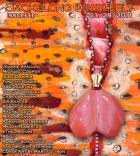Let’s start off with the obvious. Your story here includes bodies #59, 68 and 75, suggesting that there are many others. What is the scope of the longer work from which “Three Bodies” is excerpted?
This is something I’m still negotiating. Right now the highest numbered body I have is #1,200, but a lot of those come in clusters (i.e., an entry called “Bodies #1,100-1,200”) so it’s not at all as long as that makes it sound. I have several longer bodies that operate more as narratives than do the bite-sized bodies, such as “The Victim’s Body” (finished) and “The President’s Body” (as yet unfinished). The eventual goal is probably a small book, and I’ve even imagined a series of several books over the course of my life. The “form” of the bodies is one I write in brief, obsessive bursts, some several dozen at a time. Recently other things have demanded more of my attention, however.
Can you give us a sentence from “Body #1” that might provide a hint of why you started with that one?
“This body is my body.”
Your thesis for New Mexico State University is a novel: Fat Man and Little Boy. What’s that book about? And do you enjoy better writing long or writing short?
The book is about the atom bombs Fat Man and Little Boy reincarnated as people, and their attempts to make a life in the aftermath of their explosions. I am currently seeking a publisher. As a rule I’m much more a fan of long work — obviously I enjoy a lot of short fiction and poetry, and spend a fair amount of my time publishing them, but there’s really nothing in this world as satisfying to me as a novel, which has as its only constraints the necessities of beauty, complexity, and completeness. Most of my ostensibly short work tends to be quite long (for instance this 2-megabyte essay-story-thing about Angband: http://www.dzancbooks.org/storage/collagist_files/Mike_Meginnis.html) and this has made publication difficult, at times, though I’ve slowly worked out how to deal with this challenge.
The bodies are the one thing that could be called “flash fiction” that I’ve ever managed to write, and I think the scale implied by the numbers between the bodies any publication receives is important to my interest in the bodies. There’s hopefully a sense of a vast — perhaps infinite — system the reader is only glimpsing.
In addition to your own writing, you also serve as an editor at Puerto del Sol and at Uncanny Valley. How has your work as an editor impacted your own writing?
I think editing expands the possibilities of my writing tremendously. I don’t think, for instance, that I would have written the bodies without editing. I mean, I had actually written my first bodies in Butler University’s undergraduate creative writing program during an independent study with Susan Neville, in a time when my aesthetic (such as it was) was much more philosophically oriented than it is now. But I dropped the project for about four years, resuming it only after I had begun to see the potential in writing that wasn’t strictly narrative or poetic. Being an editor forces me to be aware of a much wider array of writing, because otherwise I won’t be able to find enough great work to fill my next issue.
According to your own website, you’ll be graduating from New Mexico State University in May and you’re “looking for work.” What is your dream job?
There are a lot of jobs that would make me very happy. I’ve been mostly applying for editing work, and I guess in a general sense I want something that allows me to continue learning new skills and ideas. If we’re talking truly dreamy dream jobs, of course, I have to go with “writing for video games.” Sadly I haven’t got the resume for that, it seems.



 The SmokeLong Grand Micro Contest (The Mikey) is now an annual competition celebrating and compensating the best micro fiction and nonfiction online.
The SmokeLong Grand Micro Contest (The Mikey) is now an annual competition celebrating and compensating the best micro fiction and nonfiction online.